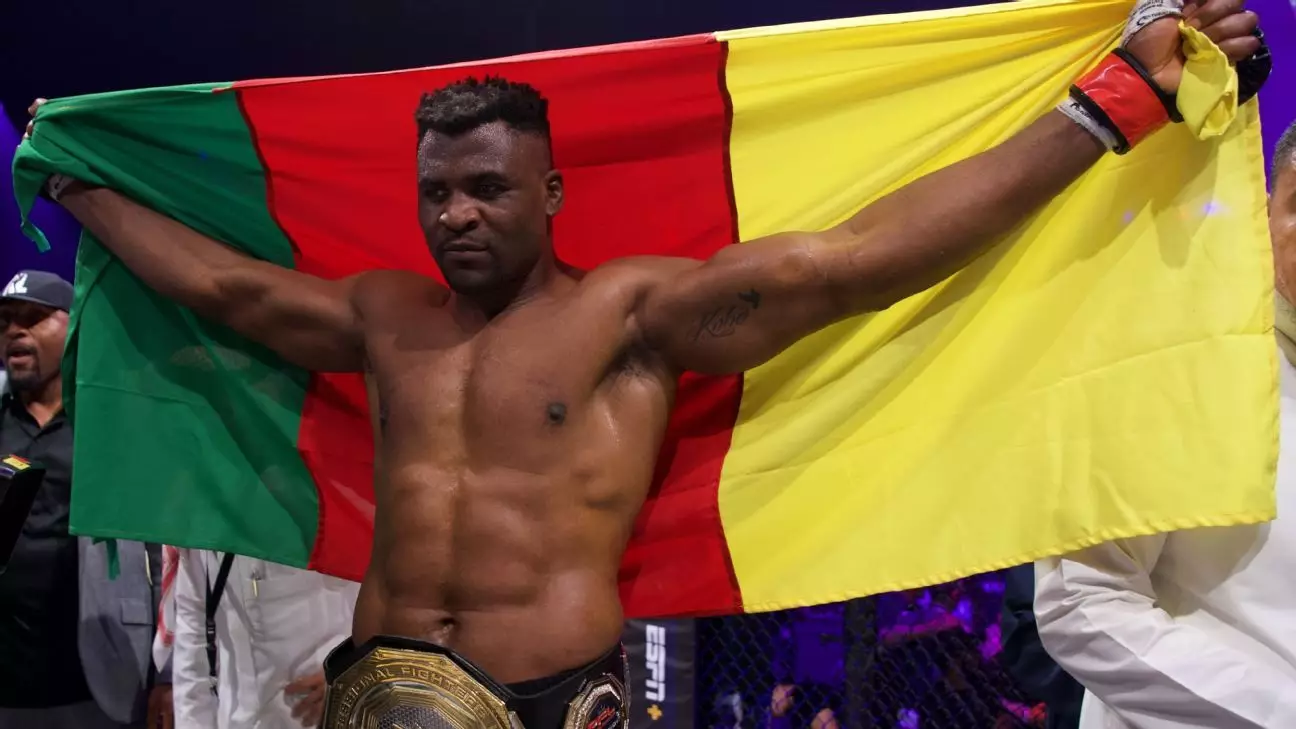Francis Ngannou, the former UFC heavyweight champion, has officially marked his return to mixed martial arts (MMA) with a significant victory over PFL heavyweight champion Renan Ferreira at PFL Super Fights in Abu Dhabi. This comeback holds special significance, not only because he emerged victorious after a two-year voyage through boxing but also because it follows a tragic personal loss—the death of his 15-month-old son. While the MMA community embraced Ngannou back into the fold after his hiatus, UFC’s Dana White chose to cast a shadow on this moment, fueling the ongoing tensions between the two.
Ngannou’s journey back to the octagon wasn’t an ordinary comeback; it was a testament to his resilience and determination. After two years away from the sport that made him famous, during which he ventured into boxing against notable opponents like Tyson Fury and Anthony Joshua, most observers celebrated his return. However, White seemed unable to acknowledge Ngannou’s achievements, stirring the pot instead with comments underlining Ngannou’s supposed reluctance to face current UFC heavyweight champion Jon Jones. It raises the question: Why is Dana White still fixated on Ngannou after all these years?
During an appearance on Sirius XM Fight Nation’s MMA Today, Ngannou confronted White’s allegations head-on. He suggested that White was not merely defending a corporate narrative but was, in fact, struggling to cope with his own perceived loss of control over the situation. “Dana has lost in this situation… and he cannot stand it,” Ngannou stated, emphasizing that White’s ongoing fixation on him is more about White’s insecurities than Ngannou’s career choices.
Ngannou criticized White’s comments regarding potential earnings, insisting that he has never made more than he has since leaving the UFC. He asserted what many could argue—that professional fighters often find themselves navigating a landscape rife with financial uncertainty and contractual complexities. Ngannou’s departure from the UFC brought him lucrative opportunities instead—reportedly earning around $20 million from his boxing matches, far exceeding what he might have made had he remained with the UFC.
White’s suggestion that Ngannou would have better financial prospects if he had stayed in the UFC is fraught with implications. Ngannou responded by flipping the narrative back onto White—questioning the legitimacy of the UFC’s financial commitments and reminding the audience of the unresolved monetary disputes following his exit. “Which money is he talking about? The money that he owes me?” Ngannou asserted. This exchange signals a deeper issue within the sport regarding transparency and fairness in financial remuneration for fighters.
Ngannou has firmly believed that the UFC still owes him backpay from fights he previously participated in, which casts a long shadow over White’s claims. As a fighter, Ngannou is not just pitted against individual competitors in the ring but also faces the machinations of a promotion that many believe can exploit or undervalue talent. His circumstances are representative of a larger discourse about fighter compensation and the balance of power in MMA—a conversation that has gained momentum over the years.
Despite the ongoing tension, Ngannou remains hopeful for a future showdown, particularly with Jon Jones, in what could potentially become one of the biggest fights in MMA history. Ngannou’s ambitions for a cross-promotional fight hinge not only on his and Jones’ willingness but also on White’s ability to set aside his ego and acknowledge Ngannou’s career trajectory outside the UFC.
“To make the fight happen, Dana has to let this beef go,” Ngannou noted. This statement emphasizes the blockages caused by promotional politics. However, there are potential avenues for this matchup to materialize, one of which involves the influential figure of Turki Alalshikh, Chairman of Saudi Arabia’s General Entertainment Authority. Alalshikh’s involvement in financing Ngannou’s recent boxing endeavors adds an international dimension to the conversation about Ngannou’s future, demonstrating how the fight landscape is increasingly becoming global.
In sum, Ngannou’s re-entry into the MMA world is not merely a comeback; it’s a complex narrative filled with personal stories, financial negotiations, and unresolved conflicts. While Ngannou seems ready to embrace new challenges and pursue monumental fights ahead, the potential for these ambitions to be realized seems inextricably linked to the dynamics of his relationship with UFC and Dana White. As fans, we can only hope that Ngannou’s resilient spirit paves the way for a more equitable fighter landscape, rich with opportunities rather than overshadowed by grudges and corporate disputes.


Leave a Reply